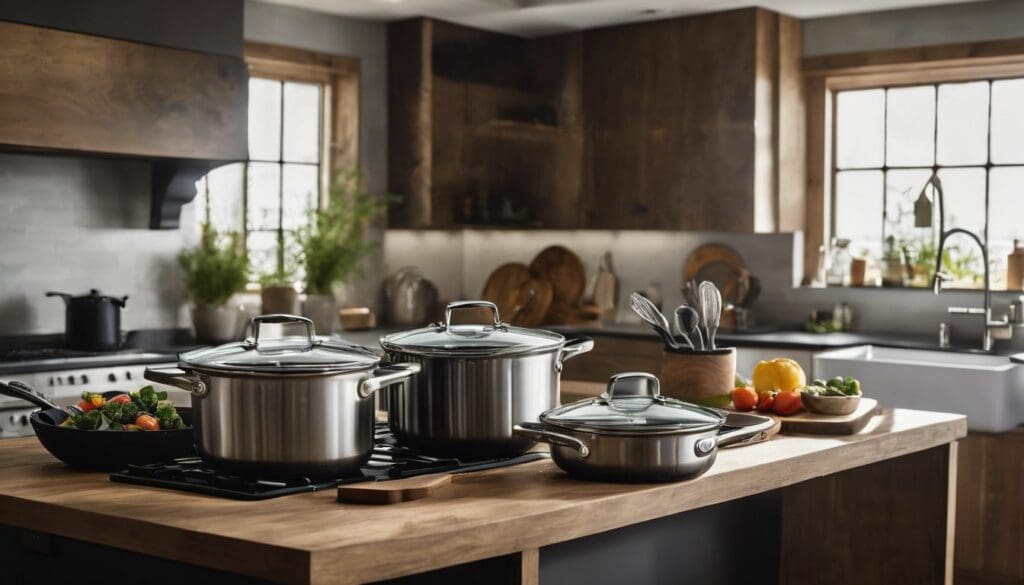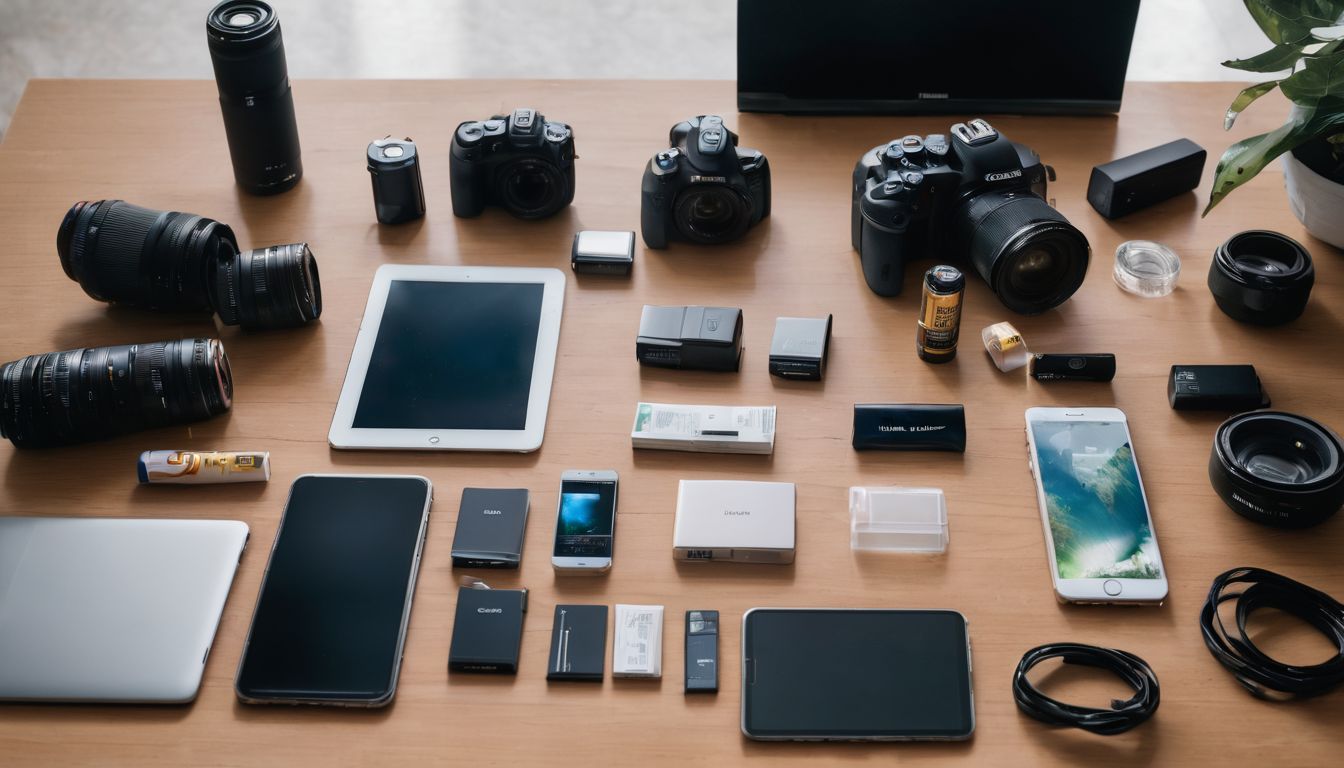We’re all too familiar with that nagging concern about whether our cookware is not only safe for our well-being but also respectful to the environment. It’s a puzzle that many of us face, mulling over which items in our kitchens won’t compromise our health or the Earth’s – did you realise, for instance, some non-stick surfaces can emit toxic chemicals if allowed to get too hot? Our diligent research has equipped us with invaluable knowledge regarding eco-friendly and harmless cooking equipment.
Let’s embark on this journey together and unearth how your culinary domain can bubble away securely and sustainably!
Key Takeaways
- Choose cookware made from materials like ceramic, hard – anodised aluminium or stainless steel for a safe and sustainable kitchen.
- Avoid non – stick pans coated with PTFE and cookware made from copper or uncoated aluminium due to potential health risks.
- Look for eco – friendly cookware that is durable, has even heat distribution, and comes with a solid warranty to ensure value for money.
- Remember to clean your eco – friendly pots and pans gently without abrasive scrubs to maintain their condition over time.
- Consider the included pieces in a cookware set to ensure it meets all your cooking needs while supporting environmentally conscious living.
Understanding Safe and Sustainable Cookware
When it comes to cookware, it’s important to consider the safety and sustainability of the materials used. Factors such as non-toxicity, durability, and eco-friendliness play a crucial role in selecting the right cookware for your kitchen.
What makes cookware safe and sustainable?
We look for cookware that won’t harm our health or the planet. Safe pots and pans are free from toxic chemicals like PFOA and PFAS, which can leach into food at high temperatures. Sustainable kitchenware means long-lasting items made from eco-friendly materials that don’t deplete natural resources or add to pollution.
We prioritise healthy cookware options crafted from responsibly sourced materials, ensuring they’re both durable and recyclable.
Our choices include nontoxic nonstick cookware, such as ceramic-coated pans that provide a safe cooking surface without releasing harmful fumes. Stainless steel sets offer a timeless option with excellent heat distribution, while enameled cast iron dishes retain flavours beautifully without risking our health.
By selecting these environmentally friendly pots and pans, we invest in kitchen tools that safeguard both our well-being and nature’s balance.
Factors to consider when choosing cookware
When selecting cookware, it is crucial to consider several factors to ensure sustainability and safety. Here are key points to keep in mind:
- Material Composition: Opt for eco-friendly materials like stainless steel, ceramic, or cast iron to avoid harmful chemicals.
- Heat Conductivity: Choose cookware with even heat distribution for efficient cooking and energy conservation.
- Durability: Select durable options that will last longer, reducing the need for frequent replacements and waste.
- Compatibility: Consider the compatibility of cookware with different stovetops and oven use for versatile cooking capabilities.
- Maintenance Requirements: Look for easy-to-clean options that don’t require special cleaning agents or excessive scrubbing.
Types of Cookware to Avoid
When searching for safe and sustainable cookware, it’s important to avoid non-stick, Teflon-coated, copper and aluminium cookware due to potential health and environmental concerns.
Instead, consider eco-friendly options such as ceramic-coated, hard-anodised aluminium, stainless steel and enameled cast iron cookware.
Non-stick cookware
Non-stick cookware, often coated with polytetrafluoroethylene (PTFE), is widely used for its convenient cooking and cleaning properties. However, the production and usage of PTFE-containing non-stick pans can release harmful Perfluorooctanoic acid (PFOA) into the environment, posing health risks to humans and wildlife.
Additionally, at high temperatures, non-stick coatings can emit toxic fumes that are potentially hazardous to respiratory health. The environmentally conscious individual should consider alternative eco-friendly options such as ceramic-coated or stainless steel cookware to reduce environmental impact and promote sustainability in the kitchen.
When considering safe and sustainable cookware options, it’s vital to be aware of the potential environmental and health impacts associated with non-stick cookware. By opting for non-toxic alternatives like ceramic-coated or stainless steel cookware, one can contribute to a greener kitchen while prioritising personal well-being and environmental conservation.
Teflon-coated cookware
When considering eco-friendly cookware options, it’s important to steer clear of Teflon-coated cookware due to its potential health and environmental concerns. Teflon contains a synthetic chemical called perfluorooctanoic acid (PFOA), which has been linked to adverse health effects and is not biodegradable, making it harmful to the environment.
Opting for non-toxic alternatives like ceramic-coated or stainless steel cookware can help create a safer and more sustainable kitchen environment.
Choosing environmentally friendly cooking tools is essential for both personal well-being and the planet’s health. By avoiding Teflon-coated cookware, individuals can contribute to reducing their exposure to harmful chemicals while supporting conservation efforts.
Copper cookware
Copper cookware conducts heat efficiently and evenly, making it a popular choice among chefs. However, copper can leach into food when cooking acidic dishes, posing health risks if ingested in large quantities.
To prevent this, copper cookware is lined with other materials such as stainless steel or tin to create a barrier between the copper and the food. It’s important to ensure that any coating on the inside of the cookware is intact and not worn down to avoid potential exposure to copper.
When considering environmentally friendly cookware options, individuals should be cautious when choosing copper cookware due to its potential health implications.
Aluminium cookware
Transitioning from discussing the drawbacks of copper cookware, it’s important to note that aluminium cookware also has its own set of concerns. Although aluminum is lightweight and conducts heat well, there are potential health risks associated with cooking acidic or salty foods in uncoated aluminum pans.
When these types of foods are cooked in direct contact with the metal for extended periods, small amounts of aluminum can leach into the food.
Additionally, when exposed to high temperatures or certain ingredients, like tomatoes or lemon juice, uncoated aluminum can react and cause discoloration and alterations to the taste of dishes.
However,, opting for hard-anodised aluminium cookware would be a safer alternative since it has undergone an electrolytic process that makes it non-reactive and harder than other forms of aluminum.
Eco-Friendly Options for Safe Cookware
When it comes to eco-friendly cookware, there are several options to choose from such as ceramic-coated, hard-anodised aluminium, stainless steel, and enameled cast iron. Each of these options provides a safe and sustainable alternative to traditional non-eco-friendly cookware.
To find out more about the benefits of each option, continue reading our blog.
Ceramic-coated cookware
Ceramic-coated cookware offers a safe and eco-friendly option for environmentally conscious individuals. The non-toxic ceramic coating provides a healthy cooking surface, free from harmful chemicals such as PFOA and PTFE.
Its durable construction ensures longevity, reducing the need for frequent replacements and minimising environmental impact. Additionally, ceramic-coated cookware is heat-resistant and distributes heat evenly, promoting energy efficiency while preparing meals.
When considering sustainable kitchen tools, it’s important to note that ceramic-coated cookware aligns with the values of green living. Its chemical-free nature and long-lasting performance make it an excellent choice for those seeking eco-conscious pots and pans.
Hard-anodised aluminium cookware
When considering eco-friendly cookware options, hard-anodised aluminium cookware stands out as a durable and sustainable choice. This type of cookware is created through an electrochemical process that makes the aluminium harder and more resistant to corrosion.
It also prevents the metal from reacting with food, making it a safe option for environmentally conscious individuals seeking nontoxic cookware. Additionally, hard-anodised aluminium cookware has excellent heat conductivity, ensuring even cooking without hot spots which aligns with the desire for safe kitchenware options.
Hard-anodised aluminium cookware provides a great alternative to nonstick coatings and other less eco-conscious materials. Its durability, resistance to wear and tear also mean it has long-lasting potential – making it an ideal choice for those looking for sustainable yet healthy cooking utensils.
Stainless steel cookware
Stainless steel cookware offers a durable and versatile option for eco-conscious kitchens. This type of cookware is free from harmful chemicals, making it a safe choice for cooking.
Stainless steel is known for its resistance to corrosion, scratching, and heat damage, ensuring longevity and reducing the need for frequent replacements. It’s also an environmentally friendly option as it can be recycled at the end of its lifecycle without negatively impacting the environment.
When properly cared for, stainless steel cookware can last a lifetime, minimising waste and promoting sustainability in the kitchen. Additionally, stainless steel is non-reactive with food, meaning no unwanted chemicals leach into your meals during cooking.
Enameled cast iron cookware
Enameled cast iron cookware offers a durable and versatile option for eco-conscious cooking. Its non-toxic enamel coating makes it a safe choice, free from harmful chemicals like PFOA and PTFE often found in non-stick coatings.
Enameled cast iron distributes heat evenly, making it energy-efficient and suitable for various cooking methods, while also being easy to clean and maintain.
With its long-lasting quality and timeless appeal, enameled cast iron cookware is an excellent addition to any eco-friendly kitchen. It not only provides a sustainable alternative but also ensures a healthy cooking experience without compromising on performance or style.
Important Factors to Consider When Buying Eco-Friendly Cookware
When choosing eco-friendly cookware, it’s important to consider the heating capacity, included pieces, and warranty. These factors ensure that you are getting the best value for your sustainable kitchen investment.
Heating capacity
When selecting eco-friendly cookware, consider the heating capacity of the materials. It’s important to choose pots and pans that distribute heat evenly to avoid hot spots and ensure thorough cooking.
Look for cookware made from materials like stainless steel or hard-anodised aluminium, which offer excellent heat conductivity and retention. These options not only provide efficient cooking but also help in saving energy during meal preparation so that we can reduce our carbon footprint while cooking.
– Included pieces
Included pieces
When considering eco-friendly cookware, it’s essential to evaluate the included pieces. Look for sets that offer a variety of pots, pans, and lids to meet your cooking needs efficiently.
Ensure that the set includes pieces suitable for different cooking techniques such as frying, boiling, and steaming. Additionally, look for extras like utensils or steamers which can add value to your purchase.
Consider whether the set provides all the necessary components needed in a kitchen; this will save you time and effort when preparing meals. Finally, ensure that the included pieces are versatile enough to cater to various recipes and cooking styles while aligning with your environmentally conscious values.
Warranty
When considering eco-friendly cookware, it’s essential to review the warranty provided by the manufacturer. This ensures protection and assistance in case of any defects or issues with the product.
Opting for cookware with a comprehensive warranty can provide peace of mind and confidence in your investment, knowing that you have support if anything goes wrong.
Manufacturers often offer varying warranty terms, so be sure to read through the details carefully. A good warranty will cover manufacturing defects and may also include guarantees on non-stick coatings or other specific features of the cookware.
How to Ensure Proper Care and Maintenance for Your Eco-Friendly Cookware
To keep your eco-friendly cookware in top condition, always follow the manufacturer’s care instructions and avoid using abrasive cleaning tools that may damage the surface. For more tips on proper care and maintenance, read our full blog.
Cleaning and storing tips
To maintain eco-friendly cookware, wipe it down using a soft sponge and mild soap to prevent food buildup. Avoid using harsh abrasives that can damage the surface of the cookware. Dry the cookware thoroughly with a cloth to prevent water spots.
- After cleaning, store your eco-friendly cookware in a dry, well-ventilated area to prevent moisture build-up and potential rusting. Ensure that lids are stored separately or with a protective layer to avoid scratching the cooking surface. If stacking pots and pans, place a soft cloth or liner between each piece to prevent damage to the coating or finish.
Common FAQs about eco-friendly cookware
Here are answers to some common questions about eco-friendly cookware:
- How can I tell if my cookware is eco – friendly?
- Are eco – friendly cookware options durable?
- What makes non – stick alternatives a better choice?
- Can eco – friendly cookware handle high heat?
- Is it safe to use metal utensils with eco – friendly cookware?
- How can I maintain the condition of my eco – friendly cookware?
- Are there any health benefits to using eco – friendly cookware?
Conclusion
In conclusion, choosing sustainable and safe cookware is essential for a healthy kitchen. Eco-friendly options like ceramic-coated, hard-anodised aluminium, stainless steel, and enameled cast iron cookware are great alternatives.
Consider factors such as heating capacity, included pieces, and warranty when making your selection. Proper care and maintenance of eco-friendly cookware ensure longevity and safety in your cooking experience.
FAQs
1. How do I choose eco-conscious cookware?
Choose pots and pans made from healthy, sustainable materials such as cast iron or stainless steel, which are safer for cooking and the environment.
2. What makes cookware safe and non-hazardous?
Safe cooking utensils don’t release harmful chemicals when heated, so look for nonstick alternatives free of toxins like PFOA and PFTE to ensure your food stays chemical-free.
3. Can green kitchenware be durable as well as eco-friendly?
Yes! Eco-conscious cookware often comes in robust materials that last a long time, reducing waste and giving you great value while being kind to the planet.
4. Are there healthy cooking tools that also help with easy cleanup?
Certainly! Selecting nonstick alternatives made from ceramic or seasoned cast iron can provide a slick surface without harmful chemicals, making both cooking and cleaning up hassle-free.
5. Why should I consider switching to eco-friendly pots and pans?
Switching supports your health by reducing exposure to toxic materials found in some common cookwares while simultaneously helping protect the environment through sustainable practices.





